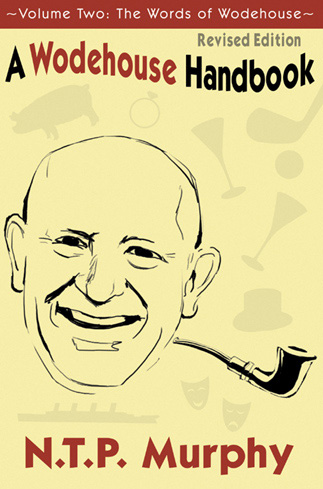|
Sybertooth Inc is a publisher of fiction, non-fiction, poetry, and
plays. If you should have any question about our publications,
please click here to contact us.
~ Reviews ~ "...these
two stout volumes contain some of the most dedicated sleuthing
in the history of literary detective work." "A
Wodehouse Handbook offers devotees of one of our great
prose stylists more invaluable background to the characters
and institutions that are the lifeblood of his novels and
musicals." "We
may know what Wodehouse meant when he wrote that a noise
sounded like GK Chesterton falling on a sheet of tin; and we
get the point about Roderick Spode and his Black Shorts. But
NTP Murphy, the author of In Search of Blandings, has
teased out every last meaning from such passages."
|
|||||||||||||||||||||||||||||||||||||||||||||
|
A
Wodehouse Handbook Click here for Volume One. Did people really speak like Bertie Wooster? Who was the celebrated Maisie? What does a Jubilee watering trough look like? Where is Loose Chippings? What was "Just Like Mother Makes"? Where does "the exile from home splendour dazzles in vain" come from? What was a gazeka? Why was Bertie Wooster more to be pitied than censured? When did young men-about-town start saying "What"? How did Bosher Street get its name? While P.G. Wodehouse's way with words has long set a standard for literary humour, much in his writing puzzles the modern reader. Volume Two of A Wodehouse Handbook answers many of the questions that arise when reading Wodehouse - especially the constant flow of quotations and deliberate misquotations that he used so skilfully. These range from the Bible and the Greek and Latin writers he knew so well, through Geoffrey Chaucer to writers like Ogden Nash and Mickey Spillane. Often he incorporated them into his stories so cunningly that the reader sometimes does not recognise them as quotations at all. Wodehouse also made a point of being up to date. From his first book in 1902 to his last in 1975, there are topical jokes, catchphrases, advertisements of the time and extracts from popular songs which everyone recognised when the books were published. In this volume, Norman Murphy explains the many references to people, places, and events that were appreciated by contemporary readers but are often mystifying today. He also identifies for us the myriad quotations that abound in Wodehouse's books and the songs, advertisements and long-forgotten catchphrases that Wodehouse used over seventy-five years. His findings, covering an extraordinary range of language and usage, from Aristotle to Variety magazine, will be of interest to all book-lovers and add to their appreciation and enjoyment of Wodehouse's superb writing. About
the Author |
|||||||||||||||||||||||||||||||||||||||||||||
Sackville · New Brunswick · Canada

